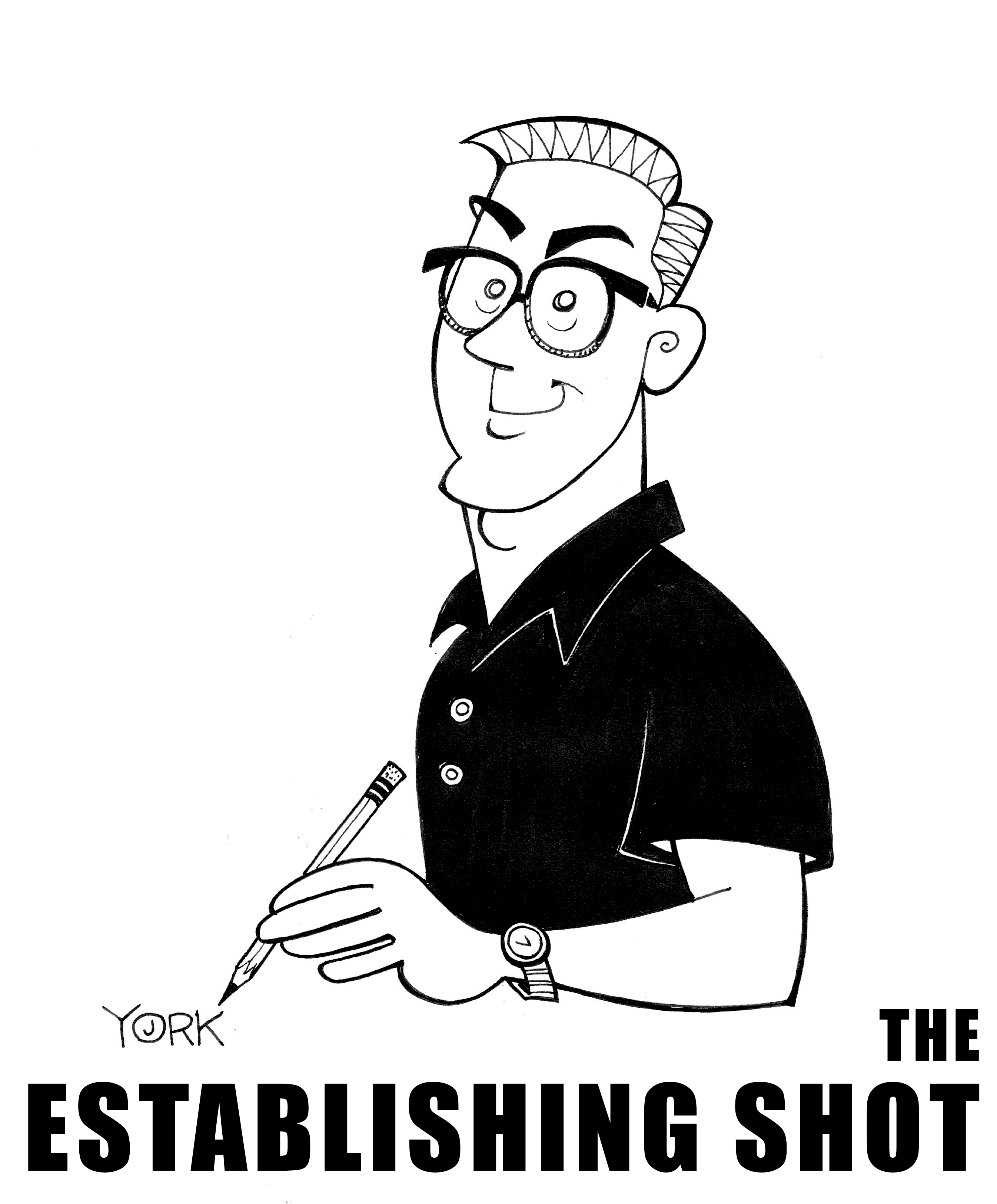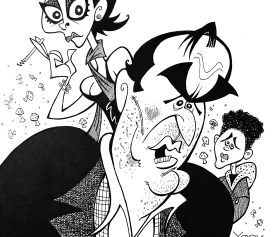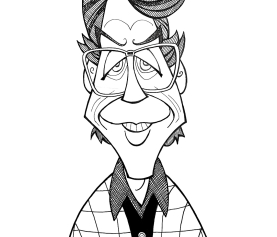
Original caricature by Jeff York of Cynthia Erivo in WICKED (copyright 2024)

Original caricature by Jeff York of Ariana Grande in WICKED (copyright 2024).
A movie adaptation rarely betters its original Broadway musical, but the first film of a two-part transfer to the screen of WICKED does so in almost every way. The detailed production design, sunshiny cinematography, and full orchestrations burst with verve throughout. Jon M. Chu’s direction displays confidence in every frame. And, most importantly, the performers equal if not surpass the original Broadway cast, and in the case of the two movie leads – Cynthia Erivo and Ariana Grande – they add dimensions to the characters of Elphaba and Glinda that deepen their witches demonstrably. In fact, this entire adaptation deepens all the feels from the stage show and builds on them exponentially. Granted, the acid test will be to see just how Chu & company adapt the show in part two – more on that later in this review – but suffice it to say this first film is a sterling achievement, one filled with brains, heart, and courage.
Based on the Broadway megahit WICKED composed by Stephen Schwartz with the book by Winnie Holtzman, the darkly wondrous source novel by Gregory Maguire, and the original novels by L. Frank Baum, the film tells the story of what happened in Oz before Dorothy and her friends dropped in. The prequel, if you will, is essentially the backstory of how Glinda, the good witch of the North, and Elphaba, the bad witch of the West, met at school and went from enemies to friends. And this vivid big-screen adaptation blends all those pieces, along with plenty of leans into the classic 1939 MGM musical THE WIZARD OF OZ as well. (Chu will tickle your funny bone with the numerous Easter eggs he includes nodding to that cherished film. My favorite? Elphaba riding on a bike with the posture of Miss Gulch.)
The whole shebang here gets a lot of mileage out of the ‘odd couple’ angle concerning the two witches. Elphaba is mature, calm, and introverted while Glinda, or Galinda as she goes by at school, is vain, excitable, and blabby. Oh, Elphaba has green-colored skin too, an obvious metaphor for any outsider struggling for acceptance. Her adversary favors girly-girl colors like an array of pinks and pastels, and fabrics just as flowing as Elphaba’s are black and sturdy. Both actresses are adept at bringing the comedy of their ‘battles’ to life, particularly Grande who is slyly hilarious and deft with her vaudevillian double-takes.
However, what the two talents play in between the lines gives this film most of its heart, and a considerable amount of courage too in that it differs quite significantly from how the parts are played on stage. Erivo conveys all of Elphaba’s hurt for sure, but she gives her character bearing that stands out as much as her emerald coloring. On stage, the original Elphaba, as played by Idina Menzel, found her strength in the character as the show went on, but Erivo arrives on-screen with most of it there already. Instead, she makes her struggle one of being seen. Will anyone recognize her abilities or understanding of the prejudices rearing their ugly heads against anyone different, including Dr. Dillamond, the goat professor voiced warmly by Peter Dinklage? He’s an activist, as is Elphaba, who join together at school to fight unseen forces bent on destruction of animal rights. Erivo’s Elphaba is more of a fighter from the get-go, with her battle less an inner conflict and more of one against the suffocating patriarchy.
Grande too re-interprets a lot of her character suggesting a sadness and knowing deep down that her Galinda isn’t all that special. (Kristen Chenoweth’s original Galinda was more self-deceiving.) Even when Grande is singing the showstopper “Popular,” she makes us feel that the cosmetic improvements her character is hawking to Elphaba are mostly superficial. Grande lets us know that via her big doe eyes that always have a tinge of sadness to them in the film. It’s her way of showing that Galinda is out of her depths and knows it from the start. That comes through crystal clear when she sings her solo part in the song “No One Mourns the Wicked” right off the bat. When Grande vocalizes “And goodness knows the wicked lives are lonely,” her eyes let us know that her witch is all but singing a confession, feeling horrible about her complicity in helping Oz hound Elphaba into the shadows. Grande’s gravitas impresses and I teared up for her with as much as Elphaba. It’s a profound interpretation by the 31-year-old superstar.
Of course, Schwartz’s music is nothing if not as dark as it often is sunny. Chu makes the most of it, embedding seriousness into virtually every scene, even those serving mostly as comic relief. Such solemnity is particularly noteworthy in the interpretations of Madame Morrible by Michelle Yeoh and the Wizard played by Jeff Goldblum. Their characters are never buffoonish, as many theatrical interpretations make them, but rather quite cold and calculating despite their helpful facade. The same goes for Fiyero as Jonathan Bailey who makes his male lead into a much stronger character by leaning into the sobering moments as strongly as the lighter ones.
Chu does well with all the choreography and editing throughout, ensuring clean lines and easy-to-follow action prevail with every cut. His take on “Dancing Through Life” is the best-conceived number in the film, a genuine showstopper filled with dancers and sets moving spectacularly together. Chu makes the smaller solo numbers just as impactful too, concentrating on the faces of Erivo and Grande as he knows they’re enough to sell any lyric. The only part that Chu doesn’t quite deliver on comes in terms of indicting the Oz citizenry. Maguire, Schwartz, Holzman, and original Broadway director Joe Mantello, all skewered the sin of mob mentality. After all, the very first lines from the chorus are “Good news! She’s dead!” as they celebrate Elphaba’s demise. Ghastly, no? But the Oz extras here are all a bit too bright and smiley when we should see them bearing fangs.
Still, Chu aces this very tricky material at almost every other turn, showing great courage in strengthening the material to comment vividly on today’s putrid political climate, as well as keeping the film so female-centric without overly sexualizing either of the leads. The director also isn’t afraid to be utterly horrifying as when the Wizard’s monkey guards sprout wings. The horrors of that scene would give most scary movies a run for their money.
Nonetheless, even with all that success, Chu will have his work cut out for him when he releases part two in November of 2025. Then, he will have a great opportunity to add not only depth and gravitas to that chapter but improve the narrative as a whole considering that the second act of the Broadway musical was considerably weaker than its first. Holzman, and her movie co-screenwriter Dana Fox, wonderfully adapt the book in this go-round, but have a much trickier task in strengthening Act Two. Hmm…will Dorothy and her friends play a bigger role? Will we see Elphaba terrorize those who aimed to ‘bring her down?’ Time will tell, but until then, we have this illustrious take to revel in. And for any such adaptation, that is very good news!






